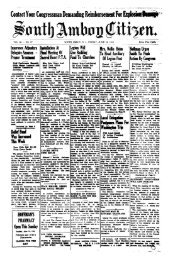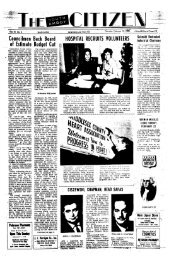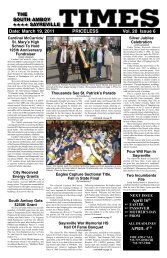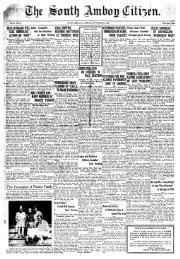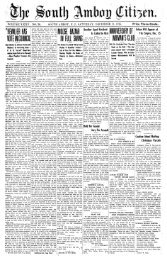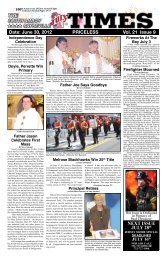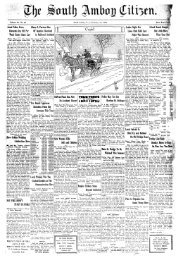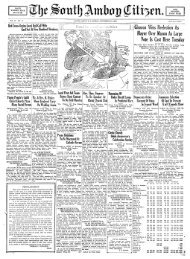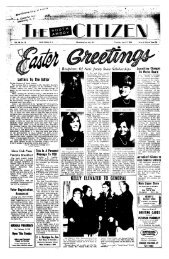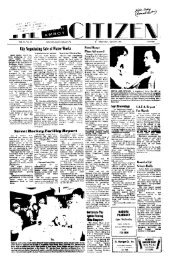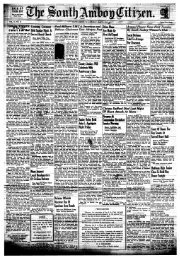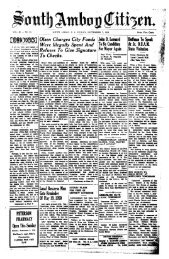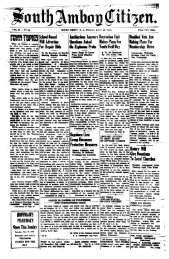1954-08-26 - Sadie Pope Dowdell Public Library
1954-08-26 - Sadie Pope Dowdell Public Library
1954-08-26 - Sadie Pope Dowdell Public Library
You also want an ePaper? Increase the reach of your titles
YUMPU automatically turns print PDFs into web optimized ePapers that Google loves.
THURSDAY, AUGUST % 19*1 THI BOOTH AMBOT ORSBf PAGEEUWEN<br />
•^<br />
THE SOUTH AMBOY CITIZEN<br />
Published evtry Thursday by<br />
Tflfi SOUTB AMBOY PUBLISHING COMPANY, Inc.<br />
Established 1*83<br />
M. C. BLOQDGOOD, Managing Editor<br />
mter*d M Second Claw Matter at the South Ambey Pott Office<br />
Under the Act of March S, 1870<br />
Subscription Rates: $2.00 per Year. Five Cento per Copy<br />
COMPOSITION BESPONglMIJTT<br />
^ ThU newspaper will net be liable for errors appearing la any<br />
advertising beyond the ooert of space occupied by the error.<br />
fm km<br />
"ALL AIR AND NO SUBSTANCE"<br />
Many were surprised at the action of the Hcuse in<br />
decisively voting down the highly controversial proposal<br />
for government reinsurance of the voluntary health insurance<br />
plans. Some sincerely felt that this was a blow to improving<br />
the ability of the American people to meet the<br />
financial exigencies of illness.<br />
The reason the House so acted was well described by<br />
Congressman Williams of Misssissippi, who said: "I took<br />
my youngster out to the park about two months ago, and<br />
she saw them selling cotton candy, all pink and pretty and<br />
inviting. Naturally, she had to have some. That cotton<br />
candy was pretty. It tasted sweet and smelled sweet, but<br />
when she tried to bite into it she found nothing there. This<br />
bill is like that cotton candy, all air and no substance, but<br />
costly." The purpose of the reinsurance idea was to<br />
, extend the benefits without increasing the cost to those<br />
[who have the protection. No one knows how great the<br />
|ultimate cost to the taxpayers would be, if this were to be<br />
jmplished on any appreciable scale. But one thing seems<br />
Brtain—it would lead to strong government domination<br />
;f the health insurance business, and to more and more<br />
government control, directly or indirectly, of medical practioe<br />
and facilities. That would be inevitable-—if government<br />
doea the paying, it doea the bossing too.<br />
The growth of health insurance in a relatively short<br />
period of time has been phenomenal. We have been given<br />
ever-improving coverage at a cost easily within the means<br />
of the majority of families. The Hcuse felt, and correctly,<br />
that there was no justification for government intervention<br />
in this field..<br />
PARTNERS<br />
Medicine has a partner that few of us associate with<br />
the healing arts—the meat industry.<br />
That's because meat animals are the source of a long<br />
list of .extremely important medical products, and the meat<br />
industry has developed elborate facilities for saving them<br />
The best known of these products is undoubtedly<br />
sulin—the substance which has literally meant th^? diflference<br />
between life %nd death to vast numbers of simerers<br />
from diabetes. But there are others whose contribution to<br />
humanity is comparable. These include ACTH c<br />
sone, used in the treatment of arthritis, rheumatic itever<br />
and other dread diseases; liver extract, for treating pertiic<br />
ious anemia; bone marrow concentrate, used to alleviate<br />
various blood disorders; fibrin foam, which controls bl<br />
ing during operations; and dehydrocholic acid, used / in<br />
treating certain gall bladder disorders. There are many<br />
more.<br />
It is quite a job to save and proptrly process/ the<br />
animal by-products from which such medicines come. As an<br />
example, it takes the pancreas glands from 7,500 pigs or<br />
1,500 cattle to make a single ounce of insulin. But our highly-developed<br />
meat industry does that job in stride, day in<br />
and day out, and millions of people are the beneficiaries.<br />
MINE INSPECTION IS A STATE FUNCTION<br />
Recommendations which will materially change the<br />
organizational makeup of the Bureau of Mines haVe been<br />
approved and made public by Secretary of the Interior<br />
McKay.<br />
One of the most important of these .has to do with inspection<br />
of coal mines. It is observed "that the ultimate<br />
effectiveness of the safety program is dependent upon the<br />
cooperation of Federal and State inspection services, mine<br />
employes, and management.' The Bureau will now concentrate<br />
major effort on education work, with the purpose of<br />
bringing all state inspection services up to the Bureau's<br />
general standards.<br />
Interior's news release says that as this is accomplished<br />
"the need for Federal coal mlno Inspection will decrease<br />
and eventually cease to exist. Any part of the appropriation,<br />
not required for inspection should be used for educational<br />
work as needed. It appears this change in activity<br />
which is under way to a email degree, can be accelerated at<br />
the present time. This statement U bated on the fact that<br />
although there are fewer coal mines, fewer coal miners and<br />
less coal production today than at any time since Federal<br />
inspection was first required, there are currently more<br />
Federal inspectors than at any previous time."<br />
The new policy certainly seems all to the good. Mine<br />
inspection is primarily a state function and responsibility.<br />
Federal inspection is a duplication of effort. It is simply<br />
common sense—to say nothing of the taxpayers' interest<br />
in the matter—that the Federal government withdraw<br />
from this activity at the earliest possible time.<br />
WITH A CAPITAL B<br />
. The belief that it is high time and then some that our<br />
system of railroad regulating be thoroughly overhauled<br />
seems to be almost universally held by those who have<br />
objectively examined the question. And the reason for it<br />
is that regulatory policy was conceived in a vanished era,<br />
and is based on obsolete concepts.<br />
Writing in the Philadephia Bulletin, Ralph W. Page<br />
expressed this view: "Our machinery for regulating the<br />
railroads was provided when they were a monopoly—Now<br />
this segment of our economy is no longer a monopoly—<br />
On the countrary, the railroads face the fiercest kind of<br />
competition." t<br />
The San Francisco News recently made this comment:<br />
"Regulation of the railroads does seem overly severe. A<br />
railroad must go through so much red tape to get permission<br />
for a rate change that by the time it is granted—if it<br />
is—the conditions that led to the original request may have<br />
changed radically—Our railroads must be strong, if the<br />
nation is to be strong."<br />
At about the ^ame time, the head of U. S. Steel observed<br />
that, among other things, the rails are being "regulated<br />
to death."<br />
These opinions are typical. And they arise from a concern<br />
for the public interest—not just the railroads' interest.<br />
Last year the railroads handled 56.0? per cent of the<br />
total commercial intercity freight traffic—more than the<br />
trucks, waterways, pipe lines and air lines combined. They<br />
are the backbone of transportation with a capital B. So<br />
anything which puts artificial barriers in the way of railroad<br />
progress hurts us all.<br />
OUR DEPENDENCY ON SHIPPING<br />
Hanson W. Baldwin, military editor of the New York<br />
Times, is one of the country's leading authorities in his<br />
field. In*- a recent column he endorsed President Eisenhowers<br />
request to Congress for a comparatively small<br />
und to aid our ailing merchant marine, and said: "Merchant<br />
shipping always has been for the United States a<br />
key element^ of Bound national defense and always will be<br />
so long as sea power forms one of the first lines of defense.<br />
This is more true today than'it was prior to World War II,<br />
despite the increased capabilities of the plane.<br />
"For the United States is now far more dependent on<br />
foreign sources for vital strategic raw materials than it<br />
was a decade or two ago. Uranium, oil, manganese, colum<br />
bium and scores of other minerals and products must be<br />
transported across the* seas to the United States if our war<br />
economy is to be maintained."<br />
Mr. Baldwin pointed out that our present merchant<br />
fleet is large in size. But the mere figures are misleading,<br />
for 80 per cent of the ships should be replaced within nine<br />
years. Yet, unless government takes the necessary action,<br />
merchant shipbuilding will come to a full stop in the relatively<br />
near future.<br />
Mr. Baldwin summed up the problem in these words:<br />
"The high cost of constructing and operating United States<br />
merchamvships is the major economic reason for the merchant<br />
marine's between-wara decline. There is no doubt,<br />
however, that the merchant marine is an essential element<br />
of our security policies as they are now envisaged."<br />
•Do What Yourself?<br />
Tho do-it-yourself movement<br />
that IJ sweeping the country 1*<br />
rapidly turning to fcrgit-ioale<br />
horns Improvement. In a recent<br />
survey of thousands of homeowneii,<br />
a lumber manufacturer<br />
determined that most bomeownerj<br />
want to make the following<br />
improvement* ID thla order it<br />
extra bathroom; 3) finished<br />
baevnent, and 3) addition of a<br />
room or rooms in the attic tor<br />
snore living<br />
New Gai Heat 4yttem<br />
No basement, no exposed radla-ton,<br />
no fuel storage space and<br />
no problem keeping oomfortably<br />
. That'* the description of<br />
now" ktod of<br />
cat-operated<br />
p<br />
heating tyatsm Imbedded In<br />
\ow. The secret lie* In steel<br />
ftfte radiant panels to * ooncrete<br />
floor slab, supplied with hot<br />
water heat by a oonttot boiler<br />
tucked swfty in a utility room<br />
HOUSEKEEPING<br />
There ought to be some kind of<br />
automatic warning device to keep<br />
wives on the alert against husbands<br />
who suddenly become ecoaontyminded:<br />
suddenly, that is, after<br />
bills come in for a new casting rod<br />
and power saw!<br />
All unconscious of budget visions<br />
dancing In JefT'B head 1 barged in<br />
airily: "Well, our old washing machint<br />
gave its last whecxe today<br />
and Just up and died! We have to<br />
have a new one now."<br />
"Can't afford it. Out of the question."<br />
That was my answer . . .<br />
short and to the<br />
point. I had intended<br />
in my<br />
scheming little<br />
mind to appeal<br />
to Jeff's mechanical<br />
nature<br />
in describing the<br />
machine I had<br />
my heart set on,<br />
Whirlpool's latest<br />
automatic washer. I really could<br />
have waxed enthusiastic over the<br />
guide lite control panel, a marvel<br />
in mechanical perfection, At your<br />
finger-tip on a beautifully-colored,<br />
fully-ttluminated panel there are<br />
choices of water temperatures for<br />
whites and cottons, prints and<br />
colors, or delicate fabrics; water<br />
levels, and washing times. Automatically,<br />
a colored light reveals<br />
your, choices, then a colored indicator<br />
follows the washer operation'<br />
so you know what's going on every<br />
step of the way!<br />
"I can show you," I pitched in,<br />
"that the new washer I have in<br />
mind will cost only half as much to<br />
operate as our old machine."<br />
Jeff got on his "prove it" look,<br />
so I explained about the 6uds-miaer<br />
which cuts soap, water and fuel<br />
costs by saving clean, sudsy water<br />
for use from one load to the next.<br />
He really perked up his ear* at<br />
that so" I explained how much<br />
water could b« sand by whig<br />
•snail amounts Instead of full capacity<br />
for a Uttle load of socks or a<br />
dab of nylons. By now Jeff was off<br />
the defensive so I went on about<br />
the fully flexible washing cycle<br />
which enables you to stop, repeat,<br />
shorten, lengthen, or skip any part<br />
of the automatic operation. I wound<br />
up the campaign with information<br />
on the seven complete rinses, an<br />
interior ultra-violet lamp to help<br />
sanitize clothes, and a dual cycle<br />
tone which sounds when a wash<br />
load ia completed!<br />
Well, we have the new washer<br />
but after all my subtle conniving<br />
it's a little maddening to hear Jen 7<br />
brag about "his" smart investment<br />
and how easy it is on the budget?<br />
But I'm biding my time waiting for<br />
Jeff to sell himself on the match*<br />
ing automatic dryer.<br />
Operation SpMge<br />
A 3.3-ton gift air conditioning<br />
unit can "sponge" 120 quarto of<br />
moisture out of the air In a 6-<br />
to 3-room house in one warm<br />
day, proving that It Isnt the<br />
heat but the humidity that<br />
cau%» discomfort. The unit provides<br />
year-round air conditioning<br />
-warming or cooling the «U<br />
and Altering and dehumldffylng<br />
It.<br />
Swear By B«*rf<br />
llueb of the world still takes Its<br />
oaths "by the beard of the Phopa-<br />
«t." At one tim* the Turks eves<br />
'measured" veracity by the fullness<br />
of the beard, and a hirsute<br />
witness needed to give no oath.<br />
Think, save a life today.<br />
W SMITH ST COKNCR KjNfl<br />
PERTH AMBOT



